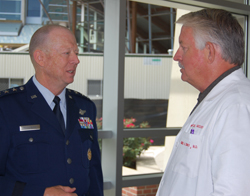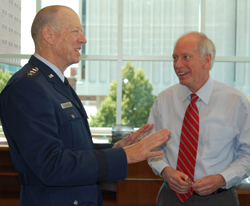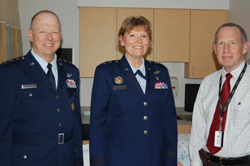 |
From left: Lt. Gen. James Roudebush, M.D., talks with UNMC surgeon Jim Edney, M.D. The two went to medical school together at UNMC. |
 |
From left: Lt. Gen. James Roudebush, M.D., talks with UNMC College of Medicine Dean John Gollan, M.D,. Ph.D. |
 |
From left: Lt. Gen. James Roudebush, M.D., Maj. Gen. Linda Hemminger and Jay Moore, M.D., pose during a tour of the Sorrell Center. Dr. Roudebush is a UNMC College of Medicine alum and Hemminger graduated from the UNMC College of Nursing in 1985. |
Lt. Gen. (Dr.) James Roudebush, originally from Gering, Neb., retraced his roots and visited the UNMC College of Medicine where he learned his profession.
The Air Force’s top doctor also met Heartland medics to discuss the strategic partnership between the Air Force and the medical school here and how medical airmen are making a difference in the war on terrorism.
Dr. Roudebush visited the UNMC College of Medicine, toured the only civilian biocontainment unit in the nation at The Nebraska Medical Center and spoke to physicians and students at the school. School officials help train physicians to become Air Force doctors.
The 1966 Gering High School graduate received his bachelor of medicine degree from the University of Nebraska-Lincoln and then earned his doctorate of medicine from UNMC in 1975.
“My education here was an extraordinary effective preparation for all the things that I’ve done in the Air Force,” Dr. Roudebush said. “As a Nebraskan, I enjoyed the benefit of the extraordinarily high quality of education that is offered here.”
|
One aspect the general sees as vital to the fight is the ability to care for wounded warriors serving throughout Iraq and Afghanistan. Service members have been injured, treated and transported in as little as 24 hours because of the Air Force’s aeromedical evacuation capability.
Airmen have the “ability to bring (injured warfighters) home safely in our Air Force air evacuation system utilizing our critical care air medical transport teams to transport these wounded individuals across thousands of miles not only simply sustaining them but also actually improving their medical condition,” he said.
With medics and major hospitals staffed in Iraq and Afghanistan, the military is seeing the lowest died-of-wounds rate in combat history with the odds of survival above 90 percent once an injured person arrives to care centers.
The general also spoke of the strategic partnership the Air Force medical service has with civilian health care providers.
“Our medical centers provide the majority of health care for our airmen, their families, beneficiaries, retirees and their families,” Dr. Roudebush said. “Quite honestly though, we cannot do it all. Some locations do not have the full spectrum of care available to do that, so we rely on our civilian counterparts to provide that care. The physicians in Bellevue and the Omaha area have been very forward leaning and very helpful in providing that care we are not able to provide within our facility at Offutt (Air Force Base).”
The UNMC College of Medicine has been a solid partner in the Air Force family practice residence program, he said. This program gives future Air Force physicians added experience in care in the rural environment, which parallels what military doctors are faced with when they transition to full-time active duty in the Air Force.
With a primary focus on taking care of Airmen, Dr. Roudebush understands the stress and demand frequent deployments can have on service members and their families. Air Force medics closely monitor airmen’s health with assessments before, during and after deployments.
“It is our duty and obligation to track that very closely and to intervene as early as possible in order to assure return to health,” he said.
Air Force Week in the Heartland runs from Aug. 9 through 17. It is a part of a proactive initiative to increase communication with the public. Air Force Week includes community visits and talks by Air Force officials, flight demonstration team performances and displays highlighting the Air Force men and women serving on the front lines.
For more information on Air Force Week in the Heartland activities, visit www.airforceweekintheheartland.com.